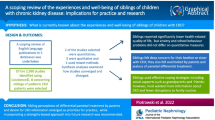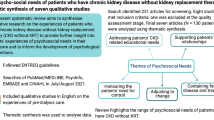Abstract
Background
Children with chronic kidney disease (CKD) generally have worse educational and psychosocial outcomes compared with their healthy peers. This can impair their ability to manage their treatment, which in turn can have long-term health consequences through to adulthood. We attempted to capture the experiences of children with CKD and to describe the perspectives of their parents and caregivers on access to educational and psychosocial support.
Methods
Children with CKD (n = 34) and their caregivers (n = 62) were sampled via focus groups from pediatric hospitals in Australia, Canada, and the USA. Sixteen focus groups were convened and the transcripts were analyzed thematically.
Results
We identified four themes: disruption to self-esteem and identity (emotional turmoil of adolescence, wrestling with the sick self, powerlessness to alleviate child’s suffering, balancing normality and protection); disadvantaged by lack of empathy and acceptance (alienated by ignorance, bearing the burden alone); a hidden and inaccessible support system (excluded from formal psychological support, falling behind due to being denied special considerations); and building resilience (finding partners in the journey, moving towards acceptance of the illness, re-establishing childhood).
Conclusions
Children with CKD and their caregivers encountered many barriers in accessing psychosocial and educational support and felt extremely disempowered and isolated as a consequence. Improved availability and access to psychosocial and educational interventions are needed to improve the wellbeing and educational advancement of children with CKD.
Graphical Abstract
A higher resolution version of the Graphical abstract is available as Supplementary information.


Similar content being viewed by others
References
Wong H, Mylrea K, Feber J, Drukker A, Filler G (2006) Prevalence of complications in children with chronic kidney disease according to KDOQI. Kidney Int 70:585–590
Becherucci F, Roperto RM, Materassi M, Romagnani P (2016) Chronic kidney disease in children. Clin Kidney J 9:583–591
Wong CJ, Moxey-Mims M, Jerry-Fluker J, Warady BA, Furth SL (2012) CKiD (CKD in Children) Prospective Cohort Study: a review of current findings. Am J Kidney Dis 60:1002–1011
Filler G, Huang SH (2010) Progress in pediatric kidney transplant. Ther Drug Monit 32:250–252
Diseth TH, Tangeraas T, Reinfjell T, Bjerre A (2011) Kidney transplantation in childhood: mental health and quality of life of children and caregivers. Pediatr Nephrol 26:1881–1892
Garralda ME, Jameson RA, Reynolds JM, Postlethwaite RJ (1988) Psychiatric adjustment in children with chronic renal failure. J Child Psychol Psych 29:79–90
McKenna AM, Keating LE, Vigneux A, Stevens S, Williams A, Geary DF (2006) Quality of life in children with chronic kidney disease—patient and caregiver assessments. Nephrol Dial Transplant 21:1899–1905
Kogon AJ, Matheson MB, Flynn JT, Gerson AC, Warady BA, Furth SL et al (2016) Depressive symptoms in children with chronic kidney disease. J Pediatr 168:164–170
Hamilton AJ, Caskey FJ, Casula A, Ben-Shlomo Y, Inward CD (2019) Psychosocial Health and Lifestyle Behaviors in Young Adults Receiving Renal Replacement Therapy Compared to the General Population: Findings From the SPEAK Study. Am J Kidney Dis 73:194–205
Pinquart M, Shen Y (2011) Depressive symptoms in children and adolescents with chronic physical illness: an updated meta-analysis. J Ped Psych 36:375–384
Kogon AJ, Vander Stoep A, Weiss NS, Smith J, Flynn JT, McCauley E (2013) Depression and its associated factors in pediatric chronic kidney disease. Pediatr Nephrol 28:1855–1861
Moreira JM, Bouissou Morais Soares CM, Teixeira AL, Silva SE, AC, Kummer AM, (2015) Anxiety, depression, resilience and quality of life in children and adolescents with pre-dialysis chronic kidney disease. Pediatr Nephrol 30:2153–2162
Richardson KL, Weiss NS, Halbach S (2018) Chronic school absenteeism of children with chronic kidney disease. J Pediatr 199:267–271
Chen K, Didsbury M, van Zwieten A, Howell M, Kim S, Tong A et al (2018) Neurocognitive and educational outcomes in children and adolescents with CKD. Clin J Am Soc Nephrol 13:387
Bailey PK, Hamilton AJ, Clissold RL, Inward CD, Caskey FJ, Ben-Shlomo Y et al (2018) Young adults’ perspectives on living with kidney failure: a systematic review and thematic synthesis of qualitative studies. BMJ Open 8:e019926
Tong A, Samuel S, Zappitelli M, Dart A, Furth S, Eddy A et al (2016) Standardised Outcomes in Nephrology-Children and Adolescents (SONG-Kids): a protocol for establishing a core outcome set for children with chronic kidney disease. Trials 17:401
Tong A, Sainsbury P, Craig J (2007) Consolidated criteria for reporting qualitative research (COREQ): a 32-item checklist for interviews and focus groups. Int J Qual Health Care 19:349–357
Glaser BG, Strauss AL (1967) The discovery of grounded theory: Strategies for qualitative research. Routledge, London
Sansom-Daly U, Peate M, Wakefield C, Bryant R, Cohn R (2011) A systematic review of psychological interventions for adolescents and young adults living with chronic illness. Health Psychol 31:380–393
Fisher E, Heathcote L, Palermo TM, de C Williams AC, Lau J, Eccleston C, (2014) Systematic review and meta-analysis of psychological therapies for children with chronic pain. J Pediatr Psychol 39:763–782
Huertas-Ceballos A, Logan S, Bennett C, Macarthur C (2008) Psychosocial interventions for recurrent abdominal pain (RAP) and irritable bowel syndrome (IBS) in childhood. Cochrane Database Syst Rev 1:CD003014
Ng QX, Venkatanarayanan N, Kumar L (2017) A systematic review and meta-analysis of the efficacy of cognitive behavioral therapy for the management of pediatric migraine. Headache 57:349–362
Pascoe MC, Thompson DR, Castle DJ, McEvedy SM, Ski CF (2017) Psychosocial interventions for depressive and anxiety symptoms in individuals with chronic kidney disease: systematic review and meta-analysis. Front Psychol 8:992
Utens EMWJ, Callus E, Levert EM, De Groote K, Casey F (2018) Multidisciplinary family-centred psychosocial care for patients with CHD: consensus recommendations from the AEPC Psychosocial Working Group. Cardiol Young 28:192–198
Law EF, Fisher E, Fales J, Noel M, Eccleston C (2014) Systematic review and meta-analysis of parent and family-based interventions for children and adolescents with chronic medical conditions. J Pediatr Psychol 39:866–886
Drotar D (1997) Relating parent and family functioning to the psychological adjustment of children with chronic health conditions: what have we learned? What do we need to know? J Pediatr Psychol 22:149–165
Soliday E, Kool E, Lande MB (2000) Psychosocial adjustment in children with kidney disease. J Pediatr Psych 25:93–103
Utens EMWJ, Callus E, Levert EM, De Groote K, Casey F (2017) Multidisciplinary family-centred psychosocial care for patients with CHD: consensus recommendations from the AEPC Psychosocial Working Group. Cardiol Young 28:192–198
Grey M, Jaser SS, Whittemore R, Jeon S, Lindemann E (2011) Coping skills training for parents of children with type 1 diabetes: 12-month outcomes. Nurs Res 60:173–181
Berger C, Valenzuela J, Tsikis J, Fletcher C (2018) School professionals’ knowledge and beliefs about youth with chronic illness. J Sch Health 88:615–623
Nisselle A, Hanns S, Green J, Jones T (2012) Accessing flexible learning opportunities: children’s and young people’s use of laptops in a paediatric hospital. Technology Pedagogy Education 21:3–20
Bachrach SJ; Nemours Children’s Health (2016) 504 Education Plans. https://kidshealth.org/en/parents/504-plans.html. Accessed 12 April 2021
Contact for Families with Disabled Children (2021) EHC plans. https://contact.org.uk/advice-and-support/education-learning/ehc-plans-assessments/what-is-an-ehc-plan/. Accessed 12 April 2021
Chrysochou C (2016) An innovative model for young adult renal care. BJRM 21:60–63
Author information
Authors and Affiliations
Corresponding author
Additional information
Publisher's note
Springer Nature remains neutral with regard to jurisdictional claims in published maps and institutional affiliations.
Electronic supplementary material
Below is the link to the electronic supplementary material.
Appendices
Appendix A Participating Sites and Institutional Review Boards
British Columbia Children’s Hospital, The University of British Columbia Research Ethics Board, Vancouver, Canada.
Alberta Children’s Hospital, The University of Calgary Research Ethics Board, Calgary, Canada.
Texas Children’s Hospital, The Institutional Review Board for Baylor College of Medicine and Affiliated Hospital, Houston, United States.
The Children’s Hospital at Westmead, The Sydney Children’s Hospital Network Human Research Ethics Committee, Sydney, Australia.
The Royal Children’s Hospital, The Melbourne Children’s Campus Research Ethics and Governance, Melbourne, Australia.
Queensland Children’s Hospital, The Children’s Health Queensland Hospital and Health Service Research Governance, Brisbane, Australia.
Appendix B Question guide
Children
We want to know what it’s like for you to have kidney problems.
-
Can you tell us a little bit about your kidney problems (how long, what treatment you have?)
-
What is it like to have kidney problems?
-
What are the hardest things about having kidney disease?
-
○ How has it impacted your mental health/education? How important are these outcomes to you?
-
○ How do you deal with these challenges? What types of support have you needed/do you need?
Parents/Caregivers
We would like to hear about your experience caring for a child with CKD.
-
How did you first find out that your child had kidney disease? How did you react/feel?
-
How has the kidney disease/dialysis/kidney transplant changed your life and your child’s life?
-
What is the most challenging thing about caring for a child with kidney disease?
-
○ How has it impacted your child’s mental health/education? How important are these outcomes for your child?
-
○ How could these outcomes be better addressed? What types of support has your child needed/does your child need?
-
○ How do you deal with these challenges? What types of support has your child needed/does your child need?
-
○ How could these outcomes be better addressed?
Rights and permissions
About this article
Cite this article
Zhang, Y., Gutman, T., Tong, A. et al. Child and caregiver perspectives on access to psychosocial and educational support in pediatric chronic kidney disease: a focus group study. Pediatr Nephrol 38, 249–260 (2023). https://doi.org/10.1007/s00467-022-05551-z
Received:
Revised:
Accepted:
Published:
Issue Date:
DOI: https://doi.org/10.1007/s00467-022-05551-z




